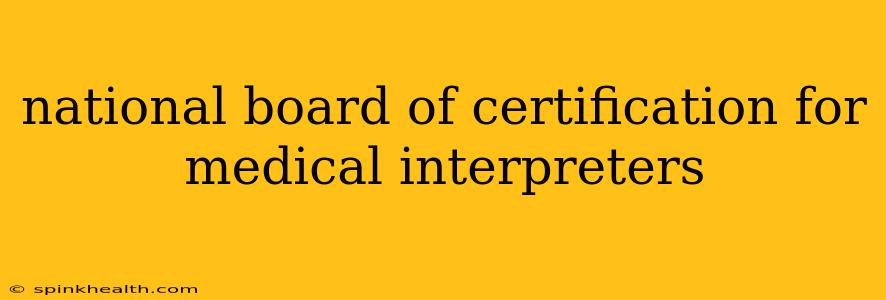The world of healthcare is complex, demanding precise communication. Imagine a scenario: a doctor urgently needs to explain a critical diagnosis to a patient who speaks only Spanish. The stakes are high, the need for accuracy paramount. This is where medical interpreters step in, bridging the gap between healthcare providers and patients with limited English proficiency. And guiding these crucial professionals is the National Board of Certification for Medical Interpreters (NBCMI). Let's delve into what the NBCMI is, what it does, and why it's so important.
My journey into understanding the NBCMI started with a simple Google search, and like many of you, I was initially overwhelmed by the intricacies of medical interpreter certification. This post aims to simplify that complexity, sharing my research and insights in a way that is both informative and relatable.
What is the National Board of Certification for Medical Interpreters (NBCMI)?
The NBCMI isn't just another certification body; it's the leading organization setting the standard for excellence in medical interpreting. Founded with the unwavering goal of enhancing healthcare quality through accurate and ethical interpretation, the NBCMI provides a rigorous certification process, ensuring interpreters possess the necessary skills and knowledge to handle the demanding nuances of medical communication. They are the gold standard, a mark of quality that patients and healthcare providers can trust.
What Does the NBCMI Do?
The NBCMI's work goes far beyond simply issuing certificates. They are actively involved in:
- Developing and maintaining rigorous certification standards: These standards ensure medical interpreters meet the highest levels of competency.
- Creating and administering the Certified Medical Interpreter (CMI) exam: This exam tests interpreters' knowledge of medical terminology, interpretation techniques, ethics, and cultural competency.
- Promoting ethical and professional practices: The NBCMI actively works to uphold the integrity of the medical interpreting profession, fostering a culture of responsibility and accountability.
- Providing resources for medical interpreters and healthcare providers: Their website is a wealth of information on best practices, ethical guidelines, and continuing education opportunities.
Think of them as the guardians of quality, ensuring that every interpreted conversation in a healthcare setting is as clear, accurate, and effective as possible.
How Do I Become a Certified Medical Interpreter (CMI)?
This is a question I frequently encountered during my research. The path to becoming a CMI isn't easy; it requires dedication, commitment, and a deep understanding of the profession. The process generally involves:
- Meeting education requirements: This typically includes formal training in interpreting or a combination of education and experience.
- Passing the CMI exam: This comprehensive exam assesses both theoretical knowledge and practical skills.
- Maintaining certification: CMIs are required to participate in continuing education to maintain their certification. This ensures they stay up-to-date on the latest medical terminology, techniques, and ethical considerations.
What Are the Benefits of NBCMI Certification?
For both interpreters and healthcare providers, NBCMI certification offers invaluable benefits:
- Interpreters gain credibility and recognition: CMI certification demonstrates expertise and professionalism, opening up more opportunities and potentially higher pay.
- Healthcare providers gain confidence in the accuracy and reliability of interpretations: Knowing an interpreter is NBCMI-certified provides peace of mind, ensuring effective communication with patients.
- Patients benefit from improved healthcare access and quality: Accurate and ethical interpretation leads to better understanding, improved compliance with treatment plans, and enhanced patient safety.
What are the Differences Between Different Medical Interpreter Certifications?
While the NBCMI certification is widely considered the gold standard, other organizations offer medical interpreter certifications. The key differences often lie in the rigor of the certification process, the specific requirements, and the level of recognition within the healthcare community. It's crucial to research different certifications to understand their specific criteria and compare them to the NBCMI's established standards.
What Does it Mean to be a Bilingual Healthcare Provider?
This often gets conflated with being a medical interpreter. While bilingual healthcare providers can certainly be helpful in simple situations, they lack the specialized training and certification that a medical interpreter possesses. A medical interpreter has been rigorously trained in the art and science of interpretation, ensuring accuracy and cultural sensitivity, while a bilingual provider may only have basic conversational skills.
Why is NBCMI Certification Important for Healthcare Quality?
Accurate medical interpretation is not merely a convenience; it's fundamental to ensuring safe and effective healthcare. Misinterpretations can lead to diagnostic errors, treatment delays, medication mistakes, and even patient harm. NBCMI certification helps minimize these risks, enhancing the overall quality of healthcare for diverse populations.
In conclusion, the NBCMI plays a vital role in upholding the standards of the medical interpreting profession, contributing significantly to the quality and safety of healthcare for all. By setting high standards and providing resources, they empower interpreters and healthcare providers to communicate effectively, ensuring that language barriers never compromise the health and well-being of patients.

